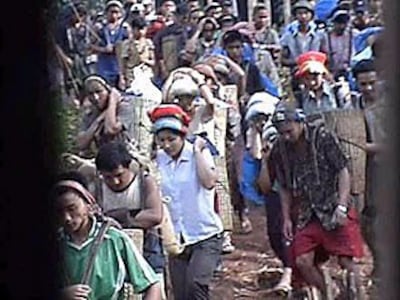Six hundred prisoners have been secretly taken out of Burma's main Insein prison in the new year to work as porters for the military, prison sources told RFA.
They are believed to be deployed on the front line of battles being waged by the ruling military junta against armed minority ethnic groups in remote areas.
A first batch of 200 prisoners was taken out of Insein prison in four military trucks on Jan. 2 and another 400 prisoners removed in eight trucks the next day—all at dawn, according to the sources, quoting eyewitnesses.
"The total is about 600 prisoners," one source said on Monday.
"The prisoners are possibly criminal prisoners, but we are not sure whether any political prisoners are among them," the source said.
There have been previous instances where hundreds of prisoners were removed from their cells and forced to carry equipment and food supplies for the military.
Some reports said they were rarely given adequate food, water, or rest, and were often made to carry out heavy manual tasks in addition to their portaging duties. In addition, there were cases cited where the prisoners-turned-porters were placed in battlefront positions that left them vulnerable to artillery fire.
Fighting

The latest move came after fighting erupted in November between a breakaway faction of the Democratic Karen Buddhist Army (DKBA), a rebel group, and Burmese government troops near the border with Thailand.
The fighting triggered rumors that the Burmese army had once again resorted to forcibly using civilians in support of military operations, according to a report in the Irrawaddy, a website run by exiled Burmese journalists.
Truck owners and drivers operating along the road between the Myawaddy township near the Thai border and the former capital of Rangoon feared that they could be commandeered by the Burmese army and forced to serve in support of military operations, the report said.
Most ethnic political groups had refused to take part in the country's much-criticized Nov. 7 election, won by a landslide by an army-backed party.
Analysts expect the junta to launch offensives against the armed ethnic minority groups in the period following the election.
Release
Meanwhile, 11 underground Burmese pro-democracy groups in a joint statement called for the immediate and unconditional release of all political prisoners.
Their release will give "true meaning" to independence day and enhance national reconciliation, said the statement issued to mark Burma's 63rd year of independence from Britain on Tuesday.

It also said that the first task of the civilian government to be formed following the November elections should be to order the release of all political prisoners.
The junta released opposition leader Aung San Suu Kyi from house arrest shortly after the November election, but about 2,200 other political detainees remain imprisoned.
"The prisoners are languishing in prisons without proper food and medicine, and the living conditions are very bad," said Zarni, a spokesman for the All Burma Federation of Student Unions, which was among the groups that signed the statement.
The others who backed the statement included the All Burma Monks Alliance, 88 Generation Students, and the Saffron Generation.
'Political control'
Junta chief Senior General Than Shwe, in a separate statement in conjunction with independence day, cautioned the people against efforts by "aggressive countries" to win political control of the nation.
"It is not strange certain covetous, aggressive countries are anxious to gain political control over a geographically strategic country like Myanmar," he said, in an apparent reference to Western powers that had imposed longstanding sanctions against the junta.
It is unclear what role Than Shwe will play in the new administration following the election. The new parliament, which will elect a president, is expected to convene in late January.
Reported by Kyaw Kyaw Aung for RFA's Burmese service. Translated by Soe Win. Written in English by Parameswaran Ponnudurai.
